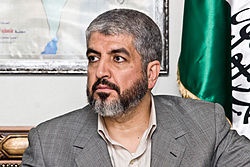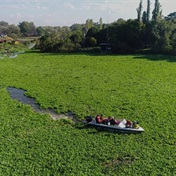
After exchanging the customary Islamic greeting, Khaled Meshaal raises a clenched fist and offers an “Amandla!”.
“Isn’t that how political discussions begin in your country,” Hamas’ political chief asked, fondly recalling his whirlwind visit to South Africa two years ago.
Two days before we met, Meshaal had just unveiled Hamas’s document of general principles and policies in the Qatari capital, Doha. The 42-point political platform presented Hamas’s vision for Palestinian liberation, and wipes away its outdated founding charter that was steeped in anti-Semitic rhetoric.
This new political manifesto is, according to Meshaal, “a reflection of the natural progression and evolution of Hamas”.
The biggest change comes in the redefinition of the oppressor. Article 16 distinguishes between Zionist colonisers occupying Palestine, and the Jewish people as a whole. The movement views the Palestinian struggle for liberation through an anti-colonial lens, rather than a religious one.
Although acknowledging that historic Palestine stretches from the Jordan River to the Mediterranean Sea, the new platform states clearly that Hamas supports the establishment of a fully sovereign and independent Palestinian state in all of the West Bank and Gaza Strip, with Jerusalem as its capital.
Palestinian refugees must be given the right to return.
While significant, this is not as radical a change as it might first appear, explains Meshaal.
Hamas has been open to the idea of a two state solution since 1997, when its leaders publicly stated their readiness to explore political solutions based on 1967 borders.
“We were ignored by Israel and the Quartet,” says Meshaal, referring to the United Nation, United States, European Union and Russia.
The new document, however, does not recognise Israel’s right to exist. Does this mean that Hamas wants to destroy Israel?
“We acknowledge Israel’s existence, but we will not recognise its right to exist,” says Meshaal.
“For us to recognise Israel’s ‘right to exist’ means that we would be legitimising our own ethnic cleansing and dispossession.”
In demanding this recognition, he continues, Israel is unlike any other state.
“Even Canada and America did not demand that its indigenous population recognise its “right” to exist”.
After a brief pause, and one of his trademark wide-eyed stares, Meshaal asks: “Were black South Africans asked to accept South Africa’s ‘right to exist’ as an apartheid state?”
For Meshaal, this is simply a recognition that Israel was not established on just grounds.
“Even Zionist leaders like Moshe Dayan know this,” he continues, referring to a candid statement by an early Israeli military leader who said “there is not a single settlement that was not established in the place of a former Arab [Palestinian] village”.
Does the document mean that Hamas will negotiate with Israel?
“The policy of Hamas at this time is not to negotiate with Israel. [Israeli prime minister] Benjamin Netanyahu has shown that he does not want peace. Israel does not recognise the basic right of our people to self-determination,” Meshaal answers emphatically.
Meshaal’s harsh assessment is accurate. Netanyahu has been prime minister of Israel for more than half the time since the peace process began. Yet he has never publicly accepted the principle of a fully independent, sovereign Palestinian state.
The document still maintains Hamas’s right to resist occupation. Does this mean that the movement isn’t committed to negotiations?
“Peace talks are not the only strategic option,” says Meshaal.
“If your enemies know that you do not possess any other option except negotiations, you don’t speak about anything except negotiations, why should they make concessions to you?” he asks earnestly.
It is for this reason that Hamas will not renounce its armed struggle.
Israeli excuses for not engaging Hamas included its support of a one-state solution, refusal to renounce resistance or recognise Israel. These, Meshaal argues, are red herrings.
“Israel has negotiated with those who have recognised it, gave up legitimate resistance, and supported a two-state solution. Did it bring us closer to peace?”
Calling the release of Hamas’s new policy document “fake news”, Netanyahu has maintained the Israeli government’s view that Hamas is a terror group bent on Israel’s destruction.
Despite the dogmatic image of Hamas put forward by Israel, the organisation has shown pragmatism and a commitment to just peace. It is now up to Israel to do the same.
• Suraya Dadoo is a researcher for Media Review Network, a Johannesburg-based advocacy group. Find her on Twitter: @Suraya_Dadoo




 Publications
Publications
 Partners
Partners








